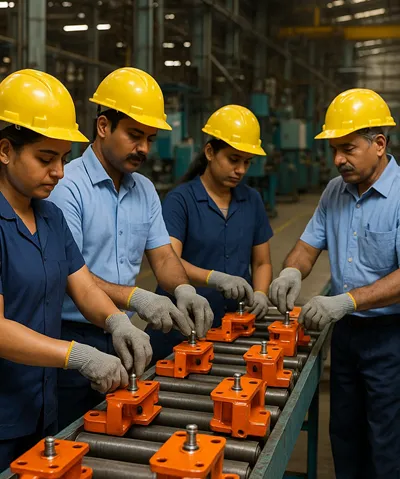
The Occupational Safety, Health and Working Conditions Code, 2020 (OSH Code) is a comprehensive labour law in India designed to enhance workplace safety, health, and welfare across various sectors. Enacted to replace 13 existing labour laws, it applies to establishments with 10 or more workers, including factories, mines, construction sites, and plantations. The Code mandates provisions for clean drinking water, sanitation, safety equipment, and welfare facilities, ensuring equitable treatment for all workers, including women, migrant, and contract workers.
Key Highlights
- Coverage: Applies to establishments with 10+ workers, including factories, mines, docks, and construction sites.
- Health & Safety: Employers must provide clean drinking water, toilets, ventilation, lighting, and safe machinery.
- Working Hours: Normal work hours are 8 hours a day; overtime must be compensated.
- Women Workers: Women can work night shifts with consent and adequate safety measures.
- Contract & Migrant Workers: Entitled to equal rights, including minimum wages and health support.
- Annual Health Check-ups: Mandatory for workers in hazardous jobs.
- Single License for Employers: Simplifies registration across states.
- Welfare Facilities: Employers must provide canteens, restrooms, first-aid boxes, and crèche facilities for female workers with children.
- Portability for Migrant Workers: Allows registration online and portability of benefits.
- Reporting Accidents: Employers must report serious accidents or injuries to authorities immediately.
-
Inspections: Labour officers can conduct surprise inspections to ensure compliance.
State/UT Labour Dept. Helpline/Portal Delhi https://labour.delhi.gov.in Maharashtra https://mahakamgar.maharashtra.gov.in/ Uttar Pradesh https://uplabour.gov.in Tamil Nadu https://labour.tn.gov.in Karnataka https://labour.karnataka.gov.in Gujarat https://labour.gujarat.gov.in/ Rajasthan https://ldms.rajasthan.gov.in/ West Bengal https://www.labour.wb.gov.in/ Kerala https://lc.kerala.gov.in/ Telangana https://labour.telangana.gov.in/home.do State-wise Implementation Updates
State Update Rajasthan Introduced the Factories (Rajasthan Amendment) Bill, 2025, allowing women to work night shifts with consent and ensuring safety measures. Gujarat Notified the Occupational Safety and Health Code, requiring all establishments to obtain safety certifications. Delhi Released draft rules under the Code on Social Security, proposing a Social Security Board and fund for unorganised workers. Frequently Asked Questions (FAQs)
-
Q1. Who is protected under this law?
-
All workers in establishments with 10 or more employees, including factories, mines, construction sites, and plantations.
-
Q2. What facilities must employers provide?
-
Clean drinking water, toilets, ventilation, lighting, and safe machinery.
-
Q3. What are the standard working hours?
-
8 hours a day; overtime must be compensated.
-
Q4. Can women work night shifts?
-
Yes, with written consent and adequate safety measures.
-
Q5. Are contract and migrant workers entitled to benefits?
-
Yes, including minimum wages, housing (in some cases), and health support.
-
Q6. Are annual health check-ups mandatory?
-
Yes, for workers in hazardous jobs.
-
Q7. Do employers need a license to hire contract workers?
-
Yes, a single license is required across states.
-
Q8. What welfare facilities must employers provide?
-
Canteens, restrooms, first-aid boxes, and crèche facilities for female workers with children.
-
Q9. Can migrant workers carry their benefits?
-
Yes, through online registration and portability of benefits.
-
Q10. How should accidents be reported?
-
Employers must report serious accidents or injuries to authorities immediately.
-
Q11. Can workplaces be inspected without notice?
-
Yes, labour officers can conduct surprise inspections.
-
Q12. What if my workplace lacks basic facilities?
-
You can file a complaint with the labour department or helpline.
-
Q13. Are small shops and offices included?
-
Yes, if they have 10 or more workers.
-
Q14. Does this law apply to both private and government jobs?
-
Yes, it applies to both sectors.
-
Q15. What if my employer doesn't follow the rules?
-
They can face penalties, fines, and legal action.
- For more information or to file a complaint, visit the official website: https://labour.gov.in/labour-codes
Add new comment